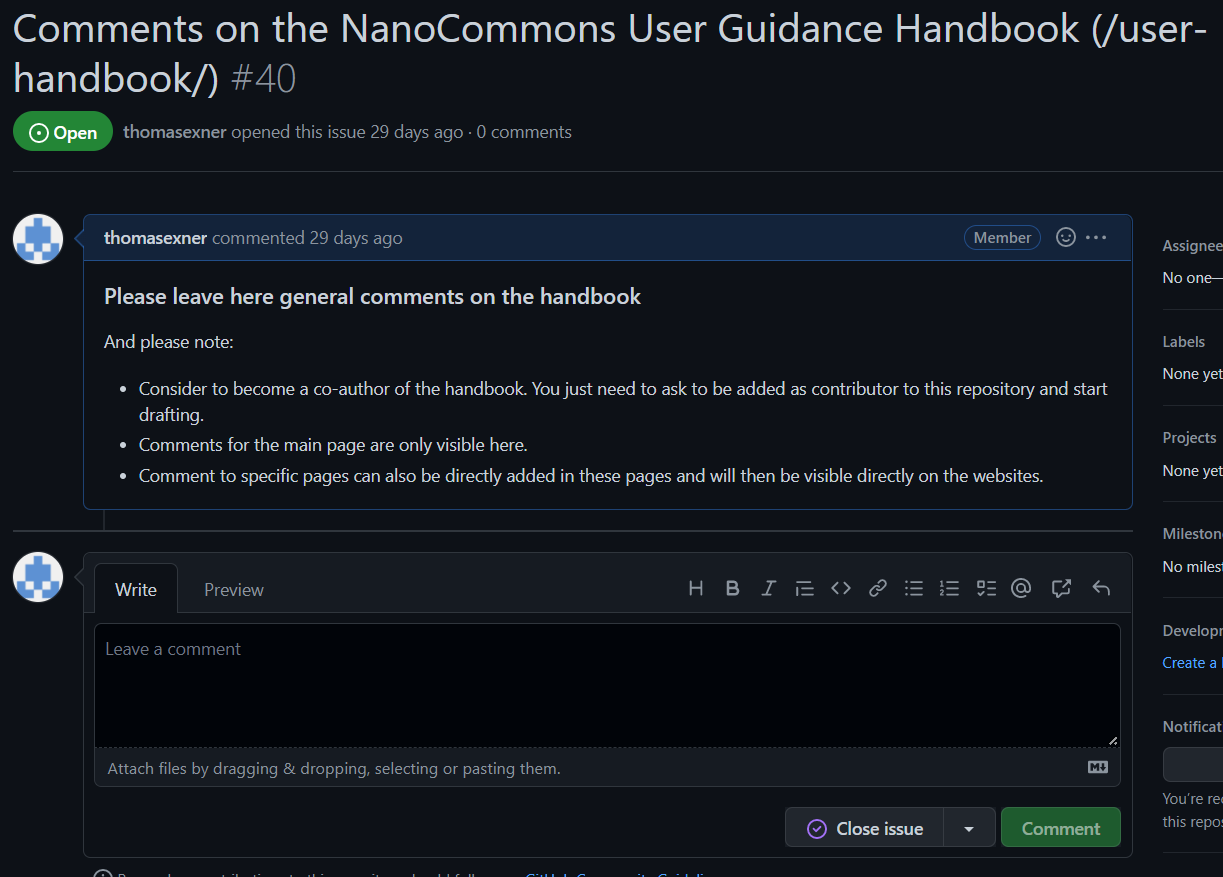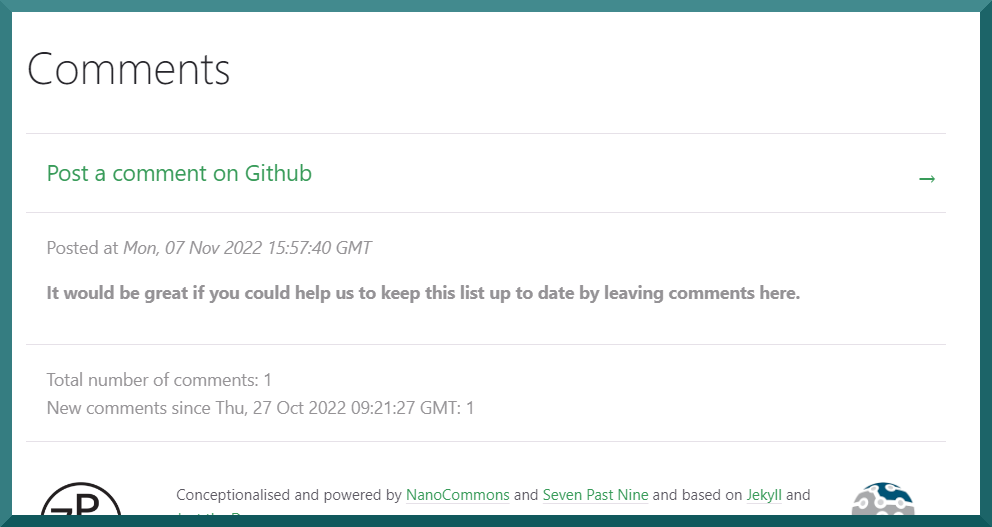About NanoCommons
This User Guidance Handbook is an activity of NanoCommons, not meaning the NanoCommons project, even if it started it all, but in the sense of a commons for nanomaterials following the definition from Wikipedia:
“The commons is the cultural and natural resources accessible to all members of a society, including natural materials such as air, water, and a habitable earth. These resources are held in common, not owned privately. Commons can also be understood as natural resources that groups of people (communities, user groups) manage for individual and collective benefit. Characteristically, this involves a variety of informal norms and values (social practice) employed for a governance mechanism. Commons can be also defined as a social practice of governing a resource not by state or market but by a community of users that self-governs the resource through institutions that it creates.”
Table of contents
The handbook is one resource of our commons collecting and structuring knowledge and training materials for the two strongly interlinked areas of data management for nanomaterials and nanoinformatics. Besides covering general concepts, guidelines and recommendations, it will show, demonstrate and train real-world solutions in the form of data sources, software and workflows integrated or linked into the NanoCommons infrastructure, where both terms are meant in a very broad sense to be able to cover as many solutions as possible from all projects working in nanosafety, nanoinformatics and neighbouring fields. All projects, from which resources are included, are listed below.
Disclaimer
The content of this Handbook is the sole responsibility of the individual contributors and does not necessarily represent the views of the NanoCommons or Partnering Projects. Mention of trade names or commercial products does not constitute endorsement by any of the Partners. The Partners and the NanoCommons Project also bear no responsibility for the accuracy, legality or content of the external site or for that of subsequent links.
We strive to ensure that our web content is always up-to-date and is correct and complete in terms of content. Nevertheless, we cannot completely exclude the occurrence of errors. The NanoCommons project, contributing partners and Seven Past Nine assume no liability for the updates, accuracy of content, or for the completeness of the information provided on this website.
Contact details
If you have questions about the content or want to propose modifications and additions, please contact info@nanocommons.eu.
For any technical issues, please contact info@sevenpastnine.com or file an issue directly on github.
List of partnering projects, platforms and networks keeping the commons for nanomaterials alive
Integrated resources
To be able to cover relevant information and knowledge to the largest possible extend without the need to replicate existing material and knowledge resources, the handbook will rely heavily on external links. This also allows that most documents can be handled by long-terms sustained exchange platforms like Zenodo or FAIR knowledge bases providing persistent identifiers to the documents or datasets. All these external links (and some internal ones) are specifically highlighted and use the following annotation with respect to the available content:
| Icon | Content type |
|---|---|
| Web application, software tool or other digital service | |
| Video | |
| Slides from presentations or posters | |
| Text documents like reports, papers or blog posts | |
| Extended material from external websites | |
| Any other type of content |
How comments work in the Handbook
Some of the Handbook pages allow to leave comments in order to discuss the content or to make suggestions how to improve it by providing more information to existing concepts, methods and tools (e.g. new extensions, new features, new publications) or adding new ones. Even if we would prefer to include you in the list of authors directly editing the GitHub pages, we included this to give you an easier way to give feedback.
Comments are still based on GitHub functionality. This has many advantages and especially security (privacy protection, spam prevention). However, this also means that you need to set up an GitHub account to be able to post comments.
Each handbook page, which allows comments, is linked to its own GitHub issues page. Here all the comments (and not only issues) can be provided.

Depending on the specific setup, these comments will then be visible on the Handbook page or will just be available when users are visiting the GitHub issues page to follow the discussions. The first case looks like this:

You can always delete your comments yourself. However, please note that we also monitor and moderate the comments. Inappropriate ones will be removed. Additionally, we will mark comments, we have addressed in an updated version of the page with ![]() . These will then not been shown on the Handbook pages anymore but are still available in GitHub. We hope that this will help keep them clean and focus on the still relevant discussions.
. These will then not been shown on the Handbook pages anymore but are still available in GitHub. We hope that this will help keep them clean and focus on the still relevant discussions.
GDPR Privacy Policy
The privacy policy explains how the personal data we collect from you when you use our website is managed, protected and used.
- Definitions
GDPR: General Data Protection Regulation Act. - What are your data protection rights?
We would like to make sure you are fully aware of all of your data protection rights. Every user is entitled to the following:- The right to access – You have the right to request copies of your personal data.
- The right to rectification – You have the right to request that any information you believe is inaccurate is then be updated. You also have the right to request that the NanoCommons partners complete the information you believe is incomplete.
- The right to erasure – You have the right to request the erasure of your personal data, under certain conditions.
- The right to restrict processing – You have the right to request the restriction of processing your personal data, under certain conditions.
- The right to object to processing – You have the right to object to the processing of your personal data, under certain conditions.
- The right to data portability – You have the right to request the transfer of data that we have collected to another organisation, or directly to you, under certain conditions.
- If you make a request, the responsible partner has one month to respond to you. If you would like to exercise any of these rights, please contact the administrator via our email address: info@sevenpastnine.com
- What data do we collect?
Personal data is neither collected directly on the website, provided in any other way to the website nor stored as part of it. - How do we collect your data?
- How will we use your data?
- How do we store your data?
- Log Data
We collect information that your browser sends whenever you visit our Site (“Log Data”) as part of standard website operation.- This Log Data may include information such as your computer’s Internet Protocol (“IP”) address, browser type, browser version, the pages of our Site that you visit, the time and date of your visit, the time spent on those pages and other statistics.
- In addition, we may use third party services such as Google Analytics which collects, monitors and analyses this information.
- Cookies
Cookies are text files placed on your computer to collect standard internet log information and visitor behaviour information. When you visit our websites, we may collect information from you automatically through cookies or similar technology.
For further information, visit allaboutcookies.org. - How do we use cookies?
Currently, no cookies are used. - What types of cookies do we use?
- How to manage cookies
You can set your browser not to accept cookies, and the above website (point 8) explains how to remove cookies from your browser. However, some of our website features may not function as a result of cookie removal. - Privacy policies of other websites
The NanoCommons User Guidance Handbook contains links to other websites. Our privacy policy applies only to our website, so if you click on a link to external website, please consult the privacy policy of this site. - Changes to our privacy policy
The NanoCommons partners keep this privacy policy under regular review and place any updates on this webpage. This privacy policy was last updated on 26 November 2022. - How to contact us
If you have any questions about this website’s privacy policy, the data we hold on you, or you would like to exercise one of your data protection rights, please do not hesitate to contact us.
Email us at: info@sevenpastnine.com